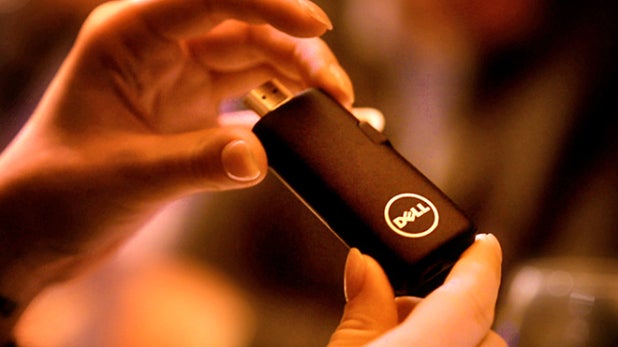Dell ships Project Ophelia: a HDMI plug-in that streams computers from the cloud
The device is being released to beta testers and will be capable of running virtual computers via the cloud

Dell, the company once synonymous with the PC market, now looks like it wants to kill the traditional desktop. It’s just shipped to beta testers the first of its Project Ophelia devices: an over-sized USB stick that turns any HDMI-capable screen into a computer running off the cloud.
First shown of at CES, the key concept behind Ophelia has been familiar to tech enthusiasts for a while (the reasoning behind the name is unknown, some wag presumably just thought the idea was insane) and is about to hit the mainstream with Google’s newly-launched Chromecast.
It goes like this: you know your TV? Isn’t it massive and didn’t you spend a lot of money on it? And don’t you use it a lot less than you use to? Well, plug this dongle into it (yes, yes, get used to using that word) with a one-two USB plus HDMI connection and boom – your TV just got computered up.
However, with Project Ophelia Dell has one more trick up its sleeve, and that’s its cloud capacity. Last year Dell bought Wyse, a company that specialises in cloud-based computing services and virtual desktop environments.
The resulting collaboration between the two companies (Dell’s Wyse PocketCloud) means that Project Ophelia will allow users to run Windows, Mac OS, Chrome OS or Android on their screen of choice.
The dongle itself will barely be ticking over (there’s not much in it beyond an ARM Cortex-A9 processor and 1GB of RAM) but on the other end of its WiFi connection Dell’s cloud servers will be running virtual computers and streaming this work over to the consumer.
Of course, this won’t be convenient (or perhaps even possible) for all users but – as Google have pushed with their Chromecast - there’s also a world of Android apps to take advantage of. Factor in the fact that more software products are becoming cloud-based services (think Microsoft’s Office becoming Office 365) and the Ophelia seems more and more plausible.
Of course, the banner headlines behind the story come with a wealth of caveats: the plug-in HDMI gizmos are still incredibly underwhelming as a user-experience; the majority of the professional business world will be sticking with traditional computers for the foreseeable future; and if connections between mobile devices and TVs become easier to access, then you may as well stick with keeping your processing power in your hand.
An extra ‘complication’ is the fact that Dell are still the world’s third-largest PC manufacturer, despite losing market share to companies like Lenovo, who have muscled in on Dell’s high-volume, low-margin business model.
Christopher Mims of Quartz has speculated that the logic of a company like Dell making the Ophelia only makes sense once you factor in that the company is in the middle of a leveraged buyout, with CEO Michael Dell attempting to things private.
Mims suggests that once the buyout is complete, the company could sell off the bits of its PC business still turning a buck and use the cash from the sales (which would add to the $14 billion they currently have) to perform a “breathtaking turnaround” and become “a company that sells services and software”.
Whether this hopeful vision for the future of Dell will ever come to pass is impossible to predict, especially with the buyout still uncertain. The final version of Ophelia is due to ship sometime in the next fiscal quarter between August and October and will cost approximately $100; if the Chromecast and similar devices prove popular in the interim, it might be launching into a receptive market - Ophelia might turn out to be not so crazy after all.
Join our commenting forum
Join thought-provoking conversations, follow other Independent readers and see their replies
Comments
Bookmark popover
Removed from bookmarks